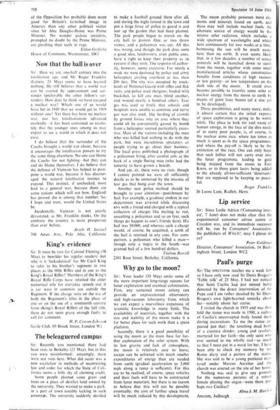Why go to the moon?
Sir: Your leader (30 May) omits some of the more important long-range reasons for lunar exploration and eventual colonisation. First, any sustained moon colony can provide an unprecedented observatory and high-vacuum laboratory from which we can expect a marvellous expansion of scientific knowledge in many fields. The availability of materials, together with the size and stability of the moon make it a far better place for such work than a space platform.
Secondly, there is a good possibility of using the moon as the main base for fur- ther exploration of the solar system. With its low gravity and lack of atmosphere, the moon is relatively easy to leave; escape can be achieved with much smaller expenditures of energy than are needed from earth (gradual acceleration to 5,000 mph along a ramp is sufficient). For this use to be realised, of course, space vehicles and their fuels will have to be constructed from lunar materials, but there is no reason to believe that this will not be possible eventually; the cost of further space travel will be much, reduced, by this development, The moon probably possesses most ele- ments and minerals found on earth, and these may well include nuclear. fuels. An alternate source of energy would be the intense solar radiation, which includes a wide spectrum of wavelengths and which lasts continuously for two weeks at a time. harnessing the sun will be much easier here than on earth. It even seems likely that, in a few decades, a number of scarce minerals will be launched down to earth from the moon, together with some small manufactured articles whose construction benefits from conditions of high vacuum or low gravity—or low temperature on the dark side of the moon. It could even become possible to transfer some solar or nuclear energy from the moon to earth by means of giant laser beams (of a size yet to be developed).
These possibilities, and many more, make it almost certain that the initial expense of space exploration is going to be worth while. The place to look for real waste of human energy, in the face of the dire needs of so many poor people, is, of course, in the nuclear arms race, where ten times as much is spent as in the space programmes, and where the pay-off is likely to be the extinction of the race. One can only hope that such follies will not carry over into the lunar programme, leading to gold being shipped from the moon to Fort Knox, or to those giant lasers being added to the already all-too-sufficient 'deterrents' that are supposed to be keeping us peace- ful.


































 Previous page
Previous page